Abstract
The United States government was founded as a democracy. Abraham Lincoln proclaimed the United States was a “government of the people, by the people, for the people”. The fourteenth and fifteen amendments of the constitution give citizens the right to vote for government officials that represent the people. Even with the United States being the world’s leader in democracy, the elections of recent years have been somewhat a disaster. From a global pandemic limiting the ability to vote in person, the controversial candidates, and a lot of misinformation available online. I propose that the United States Federal Government implements voter reform and protects and enhances voter rights.
I propose that the federal government approves and puts into the “For The People Act”. This act is designed to oppose current state legislation that is designed to make voting more difficult. The “For The People Act” specifically opposes limiting mail-in voting and fights new legislation that is meant to discriminate and discourage minority voting. The House of Representatives has already passed the “For The People Act,” and the Senate needs to follow suit.
Secondly, I propose that the federal government restores the “Voter Rights Act of 1965”. This act was signed by President Lyndon Johnson and designed to end discrimination when it comes to voting, particularly in the south. This act was originally set to last for ten years; however, after several extensions, the act is still in effect today. But the last extension is set to expire in 2021. The federal government must restore this act immediately.
Third, I propose that the federal government must improve voting infrastructure. Studies show that our decentralized voting infrastructure is at risk for attacks and voter fraud in the future. The federal government needs to take control of local voting locations. Some steps required to accomplish this include securing registration databases, eliminating wireless technologies vulnerable to hacking, conducting testing of processes, and establishing an election day anti-fraud plan.
Proposed Federal Electoral Reforms in the USA
Introduction
This paper will look at the problems that have troubled the US electoral system for a long time and will propose solutions to the problems. These problems are discrimination, campaign finance, and vulnerability of voting systems to attacks. A brief history will provide a background to the most important details of the issue, that is, discrimination. The US has a deep history of discrimination against minorities that culminated in the Civil War. Some argue that the Civil War was not about the freedom of African Americans but about state rights. This argument gets raised even today, as Southern states continue to resist what they term federal overreach. The debate about federal overreach is rich with arguments on both sides since it is not only race issues involved but also other rights, such as the right to bear arms. However, it would seem that these southern states would avoid colliding with the federal government if they enacted the antidiscrimination laws themselves without having to wait to be pushed by outside forces.
Among the most important rights, often a topic of discussion and a heated tug of war, is voting rights. The unfettered freedom for all imagined by the founding fathers may have been only a preserve of the white male since women too have had their own struggle for suffrage. After the abolition of slavery, the 15th amendment was enacted prohibiting voting discrimination. Once again, this was countered almost immediately by southern states who passed many laws during the Jim Crow era that prohibited the Black Americans from voting. The Civil Rights movement would not initialized until the 1950s, and the Civil Rights Act would not be enacted until 1964. After this landmark ruling, experts still felt that it was not enough to guarantee voting rights since elections typically have different rules. In 1965, the Voting Rights Act would be signed into law by President Lyndon Johnson.
The Voting Rights Act had special provisions that would have expiry dates depending on observed performance. Disappointingly, these provisions have been extended until today as states continue to push against federal oversight on elections. In 2013, the Supreme Court of the United States (SCOTUS) allowed states to enact their own election laws arguing that discrimination is no longer happening on the same scale as during the civil rights movement. This is, however, not true since gerrymandering is still being practiced, and felons are still denied voting rights, a majority of whom are blacks sentenced through a racist criminal justice system.
Besides voting rights, another formidable threat to the American democracy is campaign finance, where big corporations and their wealthy shareholders pour money into campaigns. It is a move that tilts the scales against the small donor. The landmark decision of 2010 granted big unions and corporations the same political rights as individuals, which led to super Public Action Committee (PAC)s. These entities can spend millions of dollars in campaigns provided they do not coordinate with the candidate. With their deep pockets, super PACs have the potential to corrupt the American political system.
Literature Review and Discussion
Need to Enact “For the People Act”
“For the People Act” is also known as the HR Act. It is a bill in the US Congress seeking to expand voting rights, reduce the influence of money on politics by amending campaign finance laws and restrict partisan gerrymandering. The bill also seeks to enact new ethics laws for holders of federal offices (Weiser et al., 2021). The bill was brought into the House of Representatives by John Sarbanes in 2019. The bill was to take advantage of the newly elected Democrat majority and did pass the House in March 2019 by a 234-193 partisan vote (Weiser et al., 2021). However, the then-Senate Majority Leader Mitch McConnell blocked the bill from receiving a vote in the Republican-majority Senate.
Campaign Finance
Billions of dollars are spent each election cycle. In the US, campaign finance happens at the local, state, and federal levels. Campaign finance law at the federal level is governed by the Federal Election Commission (FEC); the FEC is an independent federal institution. Campaign finances usually come from private sources such as donors from specific industries; public financing can also be procured by qualified candidates such as POTUS candidates during party primaries or the general election. To qualify for public funding, candidates must, of course, meet the eligibility requirements.
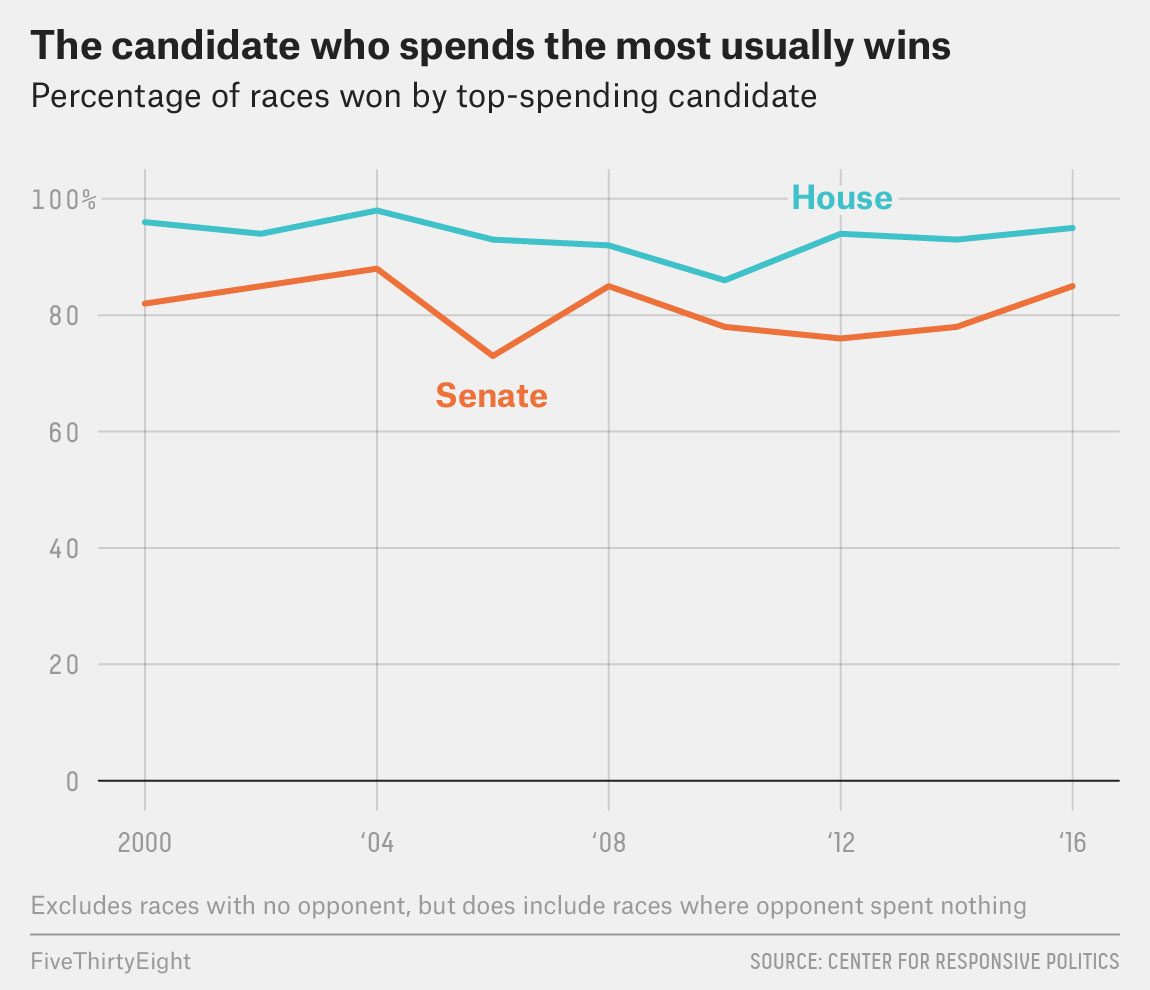
In the 2018 mid-terms, US house candidates collectively raised more campaign money by 27th of August than the House candidates had raised during the entire election cycle in 2014 (Koerth, 2018). Ad volumes had increased by 86 percent compared to the previous mid-term (Koerth, 2018). It was also reported that money from undisclosed persons (dark money) had increased by 26% (Koerth, 2018). Political scientists generally that candidates typically spend a lot of money for elections that they would win anyway. However, money is not particularly unimportant since there is a significant correlation between money spent and winning (Fig. 1).
Campaign financing is a great source of corruption in politics and a significant threat to democracy. Many restrictions to funding in American politics were thrown out of the window after the SCOTUS ruling that labor unions enjoyed equal right political speech rights as individuals (Knispel, 2020). As a result, super PACS financed by big corporations, billionaires, and powerful unions can inject millions into political campaigns. Super PACs play a dominant role in US politics and a nefarious one as they erode trust in democracy, put prioritize corporate interests, suppress voter turnout, and generally increase corruption.
Examples of SuperPACs that have played a key role in previous election cycles include the Right to Rise super PAC that spent over 86 million dollars on Jeb Bush’s unsuccessful presidential campaign run in 2016 (Murse, 2020). Another SuperPAC was the Conservative Solutions SuperPAC that spent around 56 million dollars to support Senator Marco Rubio’s unsuccessful 2016 presidential bid (Murse, 2020). Priorities USA SuperPAC spent over $133 million to support Hillary Clinton’s candidature for president in 2016 (Murse, 2020); they had also supported President Obama in 2012.
Corporations continue to argue that donations do little to influence the voting patterns of congressional members. However, candidates such as Bernie Sanders and other members of the progressive arm of the democratic party continue to receive less donor money from corporations. It is evident that corporations have vested interest in which candidates win congressional elections, and they know that money works. Interestingly, a study by Kotch (2019) revealed that members of the infamous “squad” had something in common with Trump allies in that they received a majority of their donor funds from small donors (Kotch, 2019). Certainly, large donors and corporations felt threatened by anti-establishment rhetoric.
The Need for a Return to the 1965 Voting Rights Act
The voting Rights Act was passed into law in 1965 by President Lyndon B. Johnson. The act was passed because many activists felt that the Civil Rights Act of the previous year. This was due to black people still being denied their right to vote in many Southern States. The act gave the federal government the mandate to intervene if people of any creed or color were denied a right to vote. The southern states had passed many discriminatory laws to keep African Americans from voting, such as the poll tax, literacy exams, and the grandfather clause
Some special provisions were supposed to expire by as early as 1970, but since discrimination was still happening, they kept being renewed. The act has undergone many amendments since 1965, such as in 1970, 1975, 1982, 1992, and 2006. In all these cases, the US Congress would extend provisions related to coverage except for the 1992 amendment. In 1982 and 2006, the provisions were extended for 25 years. In 2005, for which the current extension depends, the House Judiciary Committee on the constitution conducted hearings on amending the act; few witnesses opposed the extension, so they were more focused on gathering evidence on voter discrimination.
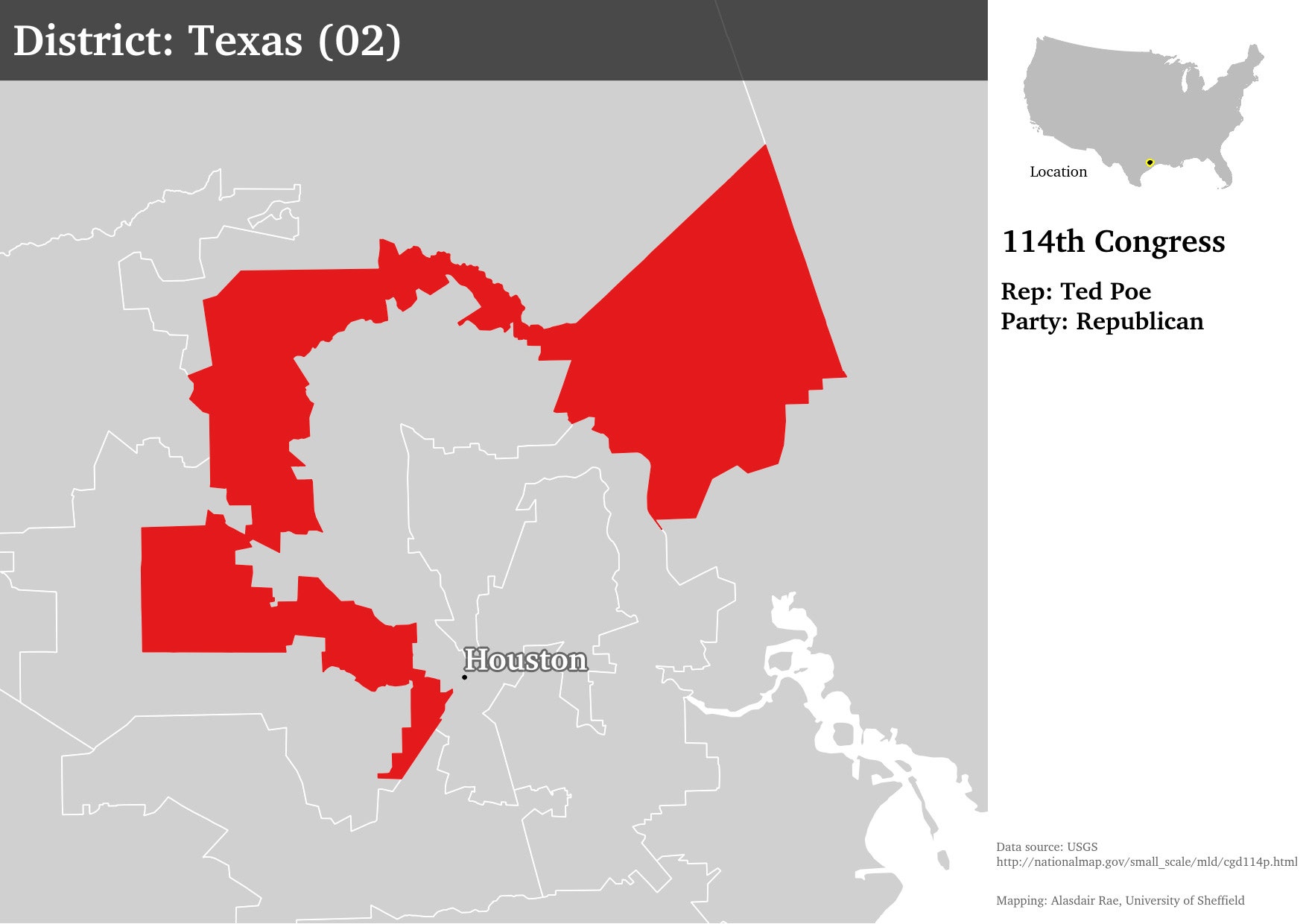
Many states in the south continue to attack the Voting Rights Act to have more control over voting. For instance, in 2013, the SCOTUS ruled 5-4 along ideological lines to allows nine states, predominantly southern, to change election laws without federal approval (Liptak, 2013). This is despite evidence that African Americans are still disenfranchised more than whites (Panetta, 2020). Systemic racism has been demonstrated where the criminal justice system imprisons blacks more (Panetta, 2020). When felons are barred from voting, yet these felons are unfairly created, it shows that there is still blatant disenfranchisement happening on the basis of race.
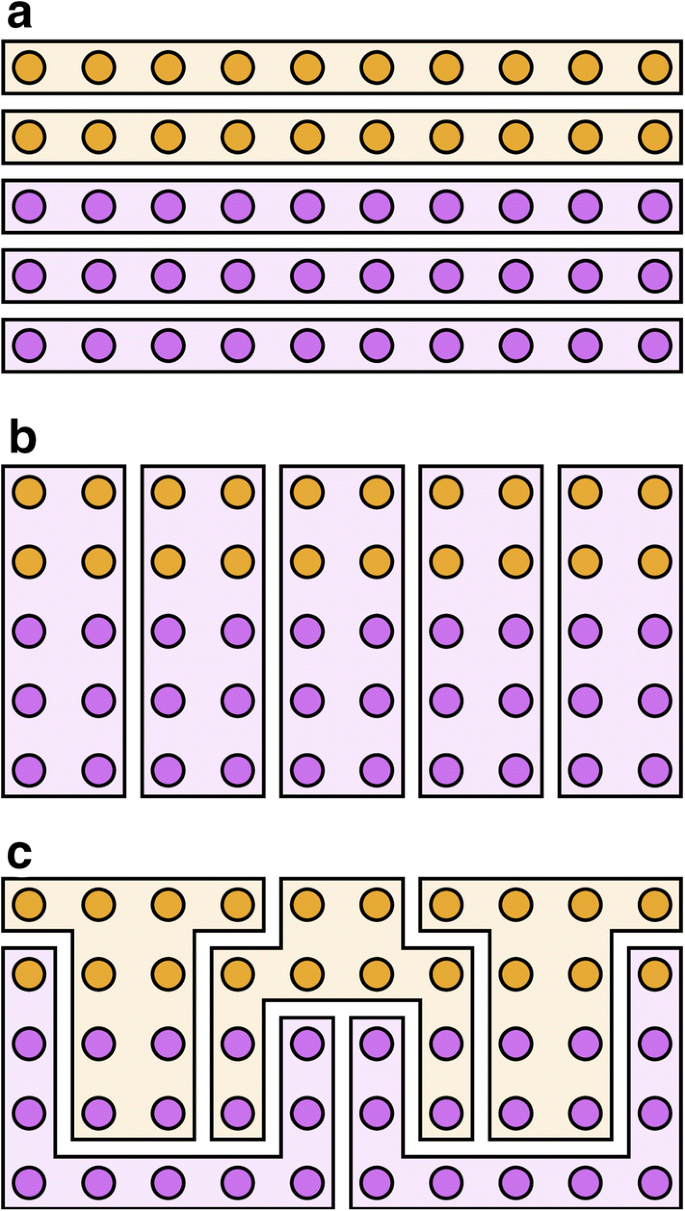
Despite the many triumphs of the Voting Rights Act, there is still blatant occurrences of voting rights discrimination. One of the most patent acts of discrimination is gerrymandering, a term that involves the redrawing of congressional districts into complex shapes to favor the interests of the dominant political faction (Fig. 2). The term was coined in 1812; quite an old term that is emblematic of America’s racist relics that are yet to be eliminated. It is worrisome that gerrymandering is still on the rise because of partisan Democrats and Republicans (Guest et al., 2019). According to Guest et al. (2019), in regions where Republicans were in charge of redistricting, they won 72% of sets with just 52 percent of the vote. Packing and cracking are the two main types of gerrymandering demonstrated in Figure 3. In packing, people likely to vote for the opposition are diluted by assigning them to many districts; an example of this is when urban districts are combined with country districts to dilute them. Contrastingly, packing involves the concentration of people who are likely to vote for opposition candidates within a few districts, an act that renders their vote inconsequential.
Need to Improve Voting Infrastructure
According to the Center for American Progress, there is a need to protect the nation’s voting infrastructure from infiltration and manipulation by foreign powers. The Department of Homeland Security (DHS) reported that it had notified twenty-one states about attempts by hackers to infiltrate their election systems during the 2016 election (Root et al., 2018). The targeted states denied that their systems had been tampered with. The hackers had only managed to get into only one state’s system, Illinois (Root et al., 2018). The DHS had not named the entity responsible for the infiltration, but many people concluded that it must have been Russia (Fig. 4). Experts all but guaranteed that a future attack on US election systems would happen.
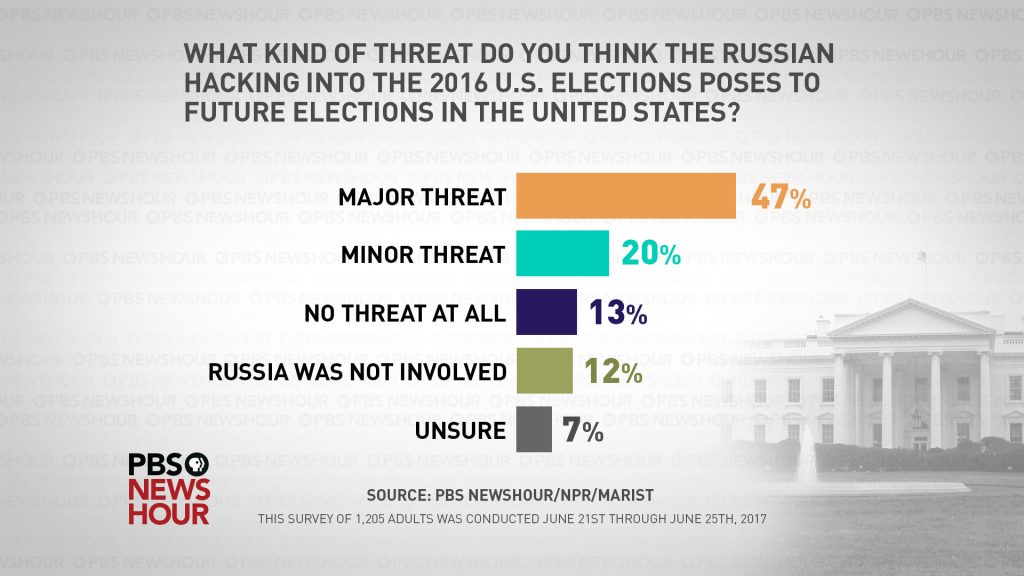
The American people are aware of the threat posed by the vulnerabilities to America’s voting systems and the ease of hacking voting machines. There is also a threat posed by misinformation campaigns from foreign enemies with the aim of confusing voters and stirring conflict. If such vulnerabilities are not addressed, they are a great threat to democracy since free and fair elections are a pillar to the American governance system. Americans use elections to choose who will represent them and decide on the nation’s future, which policies are to be enacted, and the people to champion their interests at the state and at the federal parliamentary level.
At the beginning of 2020, media outlets were rife with articles about how the 2020 election was already being hacked (Bareket, 2020). It would seem the damage of destroying confidence in the integrity of the system had already been done since when the results came out in November, they were highly disputed with the Republican presidential candidate, the incumbent Donald Trump refusing to concede. The election was marred with controversy because of the special circumstances of the pandemic that necessitated the extension of mail-in ballots usage to preclude going to the polling station physically. The issue would culminate in a national debate where Republicans would be against the process while democrats were overwhelmingly supporting the election’s credibility. It was an ironic twist since in the previous cycle, the converse was happening.
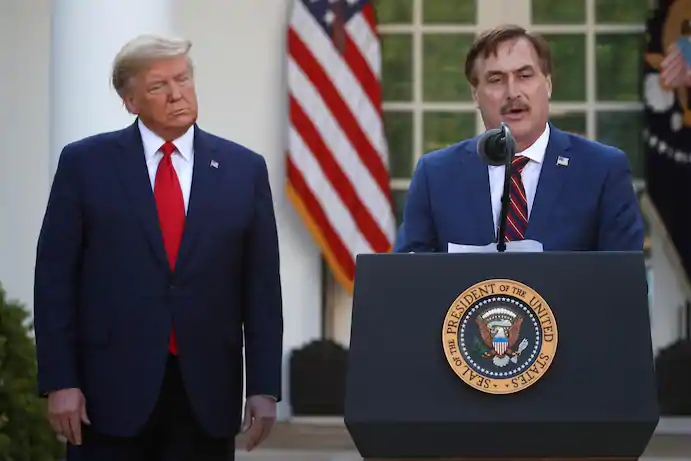
The credibility of the 2020 election in the US has been a highly polarizing debate. Extremists allied to former president Donald Trump have clung to the idea that the election was rigged to this day. The boogeyman of the debacle has been Dominion Voting Systems, a US company that sells electronic voting software and hardware. Dominion has sued multiple people for millions of dollars for defamation, including the founder of myPillow company, Mike Lindell (Corse, 2021). Mr. Lindell has been one of the most vocal accusers of Dominion and has also countersued them (Corse, 2021). These charades do nothing but further divide an already polarized nation and only underscore the need for the US to make their voting systems proof of such. Some steps required to accomplish this include securing registration databases, eliminating wireless technologies vulnerable to hacking, conducting testing of processes, and establishing an election day anti-fraud plan.
Conclusion
The main objective of this paper was to propose amendments to federal laws surrounding voting. The paper first looked at the history of voting rights in the US to gain some background on the gravity of the issue. It has been established that the US has a very dark history of denying women and racial minorities the right to vote. It was discovered that the freedom envisioned by the forefathers was only a preserve of the white male. America’s history of slavery has played a key role in the configuration of the current state of election laws since southern states wanted to maintain the disenfranchisement of the black man the same way they wanted to maintain black people in the plantations. It took the civil war to free the negro from slavery; it took the civil rights movement for black people to gain equality which was accompanied by the Voting Rights Act of 1965.
The proposed solution to the campaign finance issues is for the Senate to pass the “For the People Act.” The act passed the House vote in 2019 when the Democrats acquired majority, but the then-Senate Majority Leader blocked it from receiving a vote on the Senate floor. The act would solve the campaign finance issues and reinforce the Voting Rights Act and ban partisan gerrymandering that continues to disenfranchise millions of voters. The benefit of ending voters’ discrimination is that it will enable every citizen to have an equal voice in deciding who should govern them. It will also further elevate the US as the beacon of democracy and justice.
References
Bareket, A. (2020). Why the 2020 election is already being hacked. Web.
Brown, E. (2021). Dominion files defamation lawsuit against MyPillow CEO over false claims voting machines were rigged against Trump. Washington Post. Web.
Corse, A. (2021). Mypillow sues to counter dominion voting systems’ defamation claims. Wall Street Journal. Web.
Guest, O., Kanayet, F. J., & Love, B. C. (2019). Gerrymandering and computational redistricting. Journal of Computational Social Science, 2(2), 119–131. Web.
Knispel, S. (2020). Corporate money in politics threatens US democracy—Or does it? NewsCenter. Web.
Koerth, M. (2018). How money affects elections. FiveThirtyEight. Web.
Kotch, A. (2019). Democratic leaders rake in corporate cash as “the squad” sticks with small donors. The American Prospect. Web.
Liptak, A. (2013). Supreme court invalidates key part of voting rights act. The New York Times. Web.
Murse, T. (2020). Why super pacs are such a big deal in presidential elections now. ThoughtCo. Web.
Panetta, G. (2020). September 18 is National Black Voter Day—Here’s how Black Americans still face disproportionate barriers to voting. BI Africa. Web.
Root, D., Kennedy, L., Sozan, M., & Parshall, J. (2018). Election security in all 50 states. Center for American Progress. Web.
Santhanam, L. (2017). New poll: 54% of Americans think Trump’s dealings with Russia were unethical or illegal. PBS NewsHour. Web.
Weiser, W. R., Weiner, D. I., & Erney, D. (2021). Congress must pass the ‘for the people act’ | brennan center for justice. Web.
